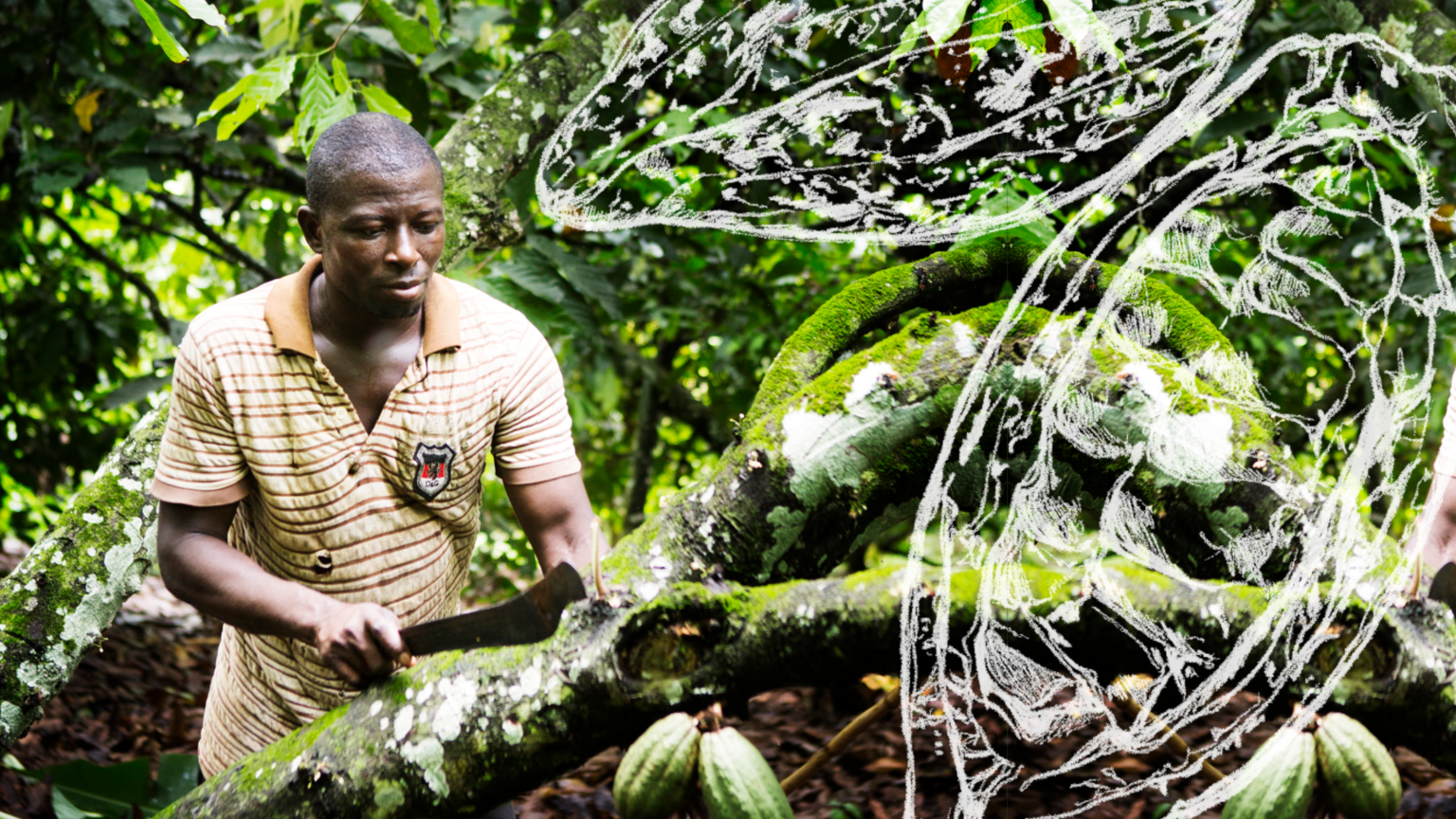Agroforestry, Cocoa, and what it means for farmers in Ghana

“Africa has a lot to teach [to] the different cuisines of the world; what we eat and food policies related to sustainability and territory are important.”
Selassie Atadika- Ghanaian Chef, Culinary Ambassador, and Foodways Advocate
We can find cocoa in cuisines and traditions around the world. To start, we can talk about what Cocoa actually is: a small, evergreen tree about 8m in height and 30cm in trunk diameter, which can be harvested at any time of the year. It can live up to 100 years old but will only produce fruit for half of its lifetime. Immature cocoa pods have a variety of colors, but most often are green, red, or purple. As they mature, their color tends towards yellow or orange. Each pod holds approximately 40 to 50 cocoa beans (seeds). We also know that cocoa is the principal component of delicious chocolate. However, it can take several hundred processed beans to produce just 500g of chocolate -- an ingredient that remains very popular in many of our favorite recipes and traditions.
In spite of -- or perhaps because of -- cocoa's widespread popularity as an ingredient and commodity, traditional cocoa farming is built on colonial models of extraction that exploit the land, farmers, and farm workers. This brings several problems related to the conventional chocolate industry:
- LAND RIGHTS: Many cocoa farmers in West Africa do not have clear legal rights to their own land, and women often have an even harder time proving ownership.
- LOW PRICES: The average household income of cocoa farmers in West Africa is $2,707 per year, well below the poverty line.
- CHILD LABOR: An estimated 2 million West African children are engaged in hazardous labour int he cocoa sector, with a significant percentage in forced or slave labor.
- DEFORESTATION: Nearly all of Côte d'Ivoire's native forests have been cut down, driven in part by bad prices and low productivity, forcing poor farmers to expand their cultivation.
- FOREST EXTRACTION: Ghanaian law grants the government rights to all timber, including on private land. This law discourages farmers from growing shade trees on cocoa farms.
- CLIMATE CRISIS: Increasing temperatures and changing climate in West Africa could reduce cocoa production by up to 30-40%.
However, there are many initiatives around the globe to plant solutions for a fair and sustainable industry:
- LIVING INCOMES: Too often, cocoa prices are based on the distant commodity market. To better support farmers, Fairtrade International is piloting a program that focuses on living incomes, starting with what a farm family needs to live and building from there.
- MORE FAIR TRADE CHOCOLATE: 67% of fair trade cocoa is sold into the conventional marketplace, robbing farmers of the benefits of the fair trade system. If more companies sourced fair trade cocoa, it could help more small-scale farmers escape poverty.
- LAND REFORM: Clear land titles can safeguard farmers and provide them with the security needed to invest in their crops. Supporting women's access to land could double farm profitability.
- INCOME DIVERSIFICATION: Biodiversity isn't just good for the planet. It also gives farmers additional crops to eat and sell. A diverse food forest can almost double a farm family's income.
- AGROFORESTRY: Growing fruit, shade trees, and timber alongside cocoa can help sequester carbon and combat climate change. These diverse agroforestry systems also protect cocoa trees from heat spikes and pests.
COCOA & THE CLIMATE CRISIS

There is a strong relation between cocoa and the climate crisis. The history of exploitation and colonization in countries like Ghana has resulted in people going there to find their cocoa and not their chocolate. This promotes the physical transformation of the territory to build enormous crops of cocoa which rise the deforestation in the region and make them more vulnerable to the effects of climate change. Also, the temperatures and humidity changes, natural disasters, and deforestation are impacting cocoa-growing regions, threatening the future of cocoa and the six million farmers that rely on it for their livelihoods.
KUAPA KOKOO & GROW AHEAD
In 2021 - 2022, Grow Ahead partnered with Kuapa Kokoo in the Offinso Municipality of Ghana to plant trees in the Agroforestry and Cocoa in Ghana project. Kuapa Kokoo is a farmers' cooperative organization and a farmers’ union of more than 100,000 smallholder coffee farmers across six cocoa-growing regions in Ghana. They are a leading producer of ethical and Fairtrade cocoa beans. Kuapa Kokoo’s agroforestry project aims to reforest cocoa farms and farmlands to create microclimates, reducing the impact of climate change on cocoa farmers. Planting cocoa in agroforestry or food-forest systems has a wide range of benefits from conserving biodiversity, strengthening soil health, microclimatic control, carbon sequestration, pest control, generating income for farmers through organic and Fairtrade product sales, and enhancing climate resiliency.
Farmers and rural communities are disproportionately impacted by the effects of climate change despite contributing significantly less to global emissions. Supporting farmer-led climate resiliency initiatives is essential so that they can protect the land and their community, and continue to provide for their families. The Agroforestry and Cocoa in Ghana project worked with 2075 farmers across 25 communities in the Offinso Municipality of Ghana, with the goal to distribute 150,000 timber tree species and 30,000 fruit trees, reforesting 11,942 acres over the two-year period of the project.
In August 2022, the project was successfully funded, with the support of our partnership with Divine Chocolate.





